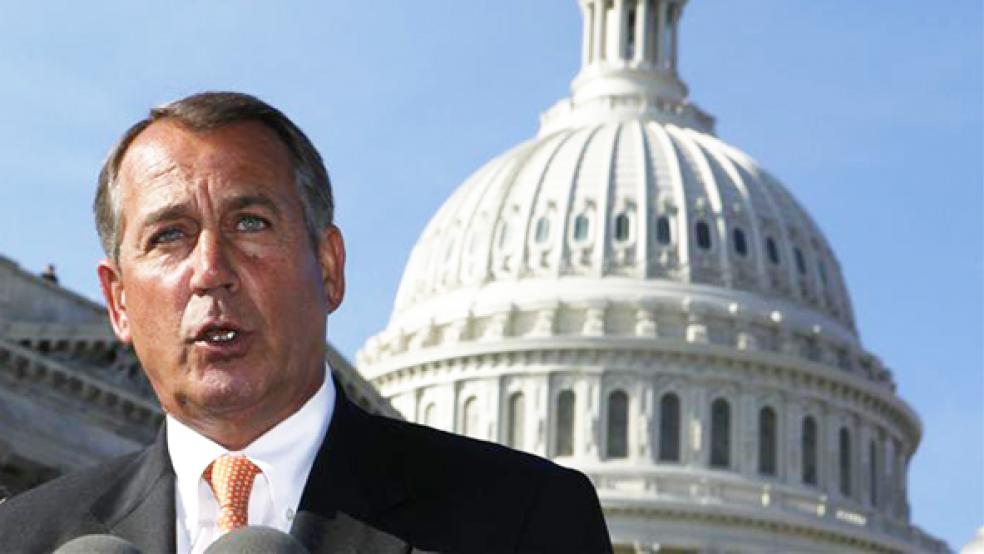As the country lurches headlong toward the fiscal cliff, House Speaker John Boehner offered an olive branch to make peace with the newly re-elected President Obama on Wednesday.

The top Republican on Capitol Hill stressed the virtues of bipartisan cooperation, but he essentially called on Obama to support the budget plan outlined by the losing presidential candidate—Mitt Romney.
Boehner expressed a willingness to allow higher tax revenues if they’re accompanied by lower tax rates made possible by closing deductions and spending reductions on entitlement programs like Medicare—all policies pushed by Romney. National security spending would be protected from “slashing” as part of a bargain designed to curb the deficit and avoid the fiscal cliff—a combination of automatic tax hikes and spending cuts— at the start of next year.
“By working together and creating a fairer, simpler, cleaner tax code, we can give our country a stronger, healthier economy,” Boehner said Wednesday afternoon several hours after Obama returned to the White House with a 50 percent to 48 percent popular vote. “A stronger economy means more revenue, which is what the president seeks.”
There’s an important nuance in that proposed deal, since the additional tax revenue would come from hypothetical economic growth rather than the government charging some taxpayer groups more. Obama spent the better part of the past year campaigning against the plan, pledging to raise taxes on American families who earn more than $250,000 a year to help close the deficit.
“In order to garner Republican support for new revenues, the president must be willing to reduce spending and shore up the entitlement programs that are the primary drivers of our debt,” Boehner said. “We aren’t seeking to impose our will on the president; we’re asking him to make good on his ‘balanced’ approach.”
Democrats have objected to GOP proposals to limit Medicare and Medicaid expenditures and any deal would have to clear the Senate where Obama’s party held onto its majority. Republicans have worked with Obama before to pass major measures, as they did a year ago in raising the debt ceiling and hammering out a $2.2 trillion package of long term deficit reduction that also in a perverse consequence set up the fiscal cliff.
Even as Boehner channeled the same spirit of bipartisanship that Obama embraced in his victory speech after Tuesday’s election, the message from the GOP was that the burden of compromise—despite the outcome of Tuesday’s election—rests solely with the president.
“Now it’s time for the president to propose solutions that actually have a chance of passing the Republican-controlled House of Representatives and a closely-divided Senate, step up to the plate on the challenges of the moment, and deliver in a way that he did not in his first four years in office,” said Senate Minority Leader Mitch McConnell, R-Ky.
While voters as a whole favor ending the political gridlock of the past two years, the 2012 elections showed the public did not penalize Republican and Democratic lawmakers for the collective dysfunction of the 112th Congress.
Because of highly segregated congressional districts, few House races produced anything close to a nail-biter. In many cases the margin of victory for House congressmen was greater than the chamber’s approval rating—13 percent, according to the Gallup Organization.
Consider what happened in the electoral battleground of Virginia. Obama won by a slim 3-point margin. But in the commonwealth’s 11 House races, the average margin of victory was an incredible 23.88 percent. Ten of the congressional races were double-digit wins. And while Virginia elected a Democratic president and senator on Tuesday, it sent eight Republicans to the House of Representatives.
In Boehner’s own Ohio congressional district, more than 62 percent voted for Romney and just 35.6 percent went for Obama.
Some GOP lawmakers say that the leadership is kidding itself if it ignores the public weariness of legislative gridlock and Republican policies are alienating increasingly important blocs of voters including Hispanics, blacks and women.
Sen. John Cornyn of Texas, the chairman of the National Republican Senatorial Committee, said late Tuesday that “it’s clear with our losses in the presidential race, and a number of key Senate races, we have a period of reflection and recalibration ahead for the Republican Party. While some will want to blame one wing of the party over the other, the reality is candidates from all corners of our GOP lost tonight.”
The Democrats’ strong showing in the Senate races was capped yesterday when Democrat Heidi Heitkamp was declared the winner over GOP Rep. Rick Berg in the race to succeed Senate Budget Committee Chairman Kent Conrad of North Dakota
Heitkamp's win brings Democratic control of the Senate to 53 seats thus far. Republicans have 45 seats, while there is one Democratic-aligned independent and one independent, Sen.-elect Angus King (I-Me.) who has not announced who he will caucus with yet.
But any transformation of the Republican party must find ways to appease the Tea Party movement and independent groups like Americans for Prosperity and Americans for Tax Reform. Both groups saw the elevation of House Budget Committee Chairman Paul Ryan as the party’s vice presidential nominee as confirmation of a further rightward shift, despite the loss Tuesday.
“This election showed Republicans in the House the ‘Path to Prosperity’ authored by Paul Ryan was not simply sound on principle, but a political advantage,” wrote anti-tax advocate Grover Norquist. “They have an agenda. They voted for it. They won re-election.”





